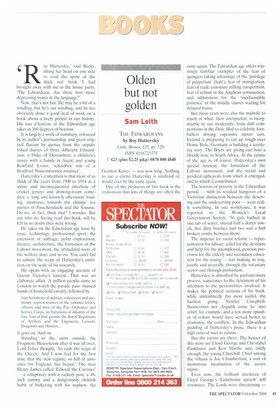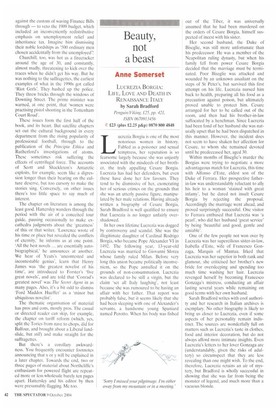Olden but not golden
Sam Leith
THE EDWARDIANS by Roy Hattersley Little, Brown, £25, pp. 520, ISBN 03167253 74 rt.) £23 (plus £2.25 p&p) 0870 800 4848
German Kaiser — was now king. Nothing, to use a cliche Hattersley is unafraid of, would ever be the same again.
One of the pleasures of this book is the realisation that lots of things are often the oy Hatters Icy,' said Becky, tilting her head on one side to read the spine of the thick red book I had brought away with me to the house party. 'The Edwardians. Are there four more depressing words in the language?'
Now, that's not fair. He may be a bit of a windbag, but he's our windbag, and he has obviously done a good deal of work on a book about a lively period in our history. His tour &horizon of the Edwardian age takes in 360 degrees of horizon.
It is largely a work of summary, coloured by its author's partisanship, and given original flavour by quotes from the unpublished diaries of three different Edwardians: a Duke of Devonshire; a children's nanny with a family in Ascot; and young Rowland Evans, 'schoolboy son of a Bradford Nonconformist minister'.
Hattersley's contention is that most of us think of the years from 1900 to 1914 as a sunny and inconsequential interlude of cricket jerseys and drawing-room comedies: a 'long and leisurely afternoon' leading, unawares, towards the chimps' tea parties of Passchendaele and the Somme. Do we, in fact, think that? I wonder, But any who do, having read this book, will be left in no doubt they were wrong.
He takes on the Edwardian age issue by issue: technology, professional sport, the extension of suffrage, polar exploration, theatre, architecture, the formation of the Labour movement, the attitudinal roots of the welfare state and so on. You can't fail to admire the scope of Hattersley's ambition, or the scale of his research.
lie opens with an engaging account of Queen Victoria's funeral. That was an elaborate affair. A million people came to London to watch the parade pass: massed bands of household cavalry, followed by
four battalions of militias, volunteers and yeomanry, representatives of the colonial levees, officers and men of the Pay, Ordnance and Service Corps, six battalions of infantry of the line, four of foot guards, the Royal Regiments of Artillery and the Engineers, Lancers, Dragoons and Hussars...
It goes on. And on.
Standing in the snow outside the Frogmore Mausoleum after it was all over, Lord Esher thought, 'So ends the reign of the Queen. And I now feel for the first time that the new regime, so full of anxieties for England, has begun.' The man Henry James called 'Edward the Caresser' — a voluptuary with a rackety past, a 48inch tummy and a dangerously childish habit of bickering with his nephew, the same again. The Edwardian age offers winningly familiar examples of the fear of spongers taking advantage of the 'privilege of pauperism' (hall!), fear of immigration, fear of trade unionism stifling competition, fear of schism in the Anglican communion, and admiration for the 'inexhaustible patience' of the middle classes waiting for delayed trains.
But those years were also the midwife to much of what, then unexpected, is recognisable in our modernity: from daft competitions in the Daily Mail to celebrity footballers driving expensive motor cars. Ireland is preparing to cut up rough over Home Rule. Germany is building a terrifying navy. The Boers are giving our boys a bloody nose in South Africa. At the centre of the age is, of course, Hattersley's own special interest: the formation of the Labour movement, and the social and juridical upheavals from which it emerged, and to which it contributed.
The horrors of poverty in the Edwardian period — with its residual hangover of a Victorian distinction between the deserving and the undeserving poor — were really something. In one workhouse, it was reported to the Women's Local Government Society, '56 girls bathed in one tub of water, shared half a dozen towels, five dirty brushes and two and a half broken combs between them'.
The impetus for social reform — representation for labour, relief for the destitute and help for the unemployed, pension provision for the elderly and secondary education for the young — was making its way, jointly and severally, through the voluntary sector and through parliament.
Hattersley is absorbed by parliamentary process, sometimes to the detriment of his attention to the personalities involved. It makes the political sections of his book, while undoubtedly the most useful, the hardest going. Neither CampbellBannerman nor Asquith come far into relief, for example, and a few more splashes of colour would have served better to dramatise the conflicts. In the Edwardian pudding of Hattersley's prose, there is a high ratio of suet to raisins.
But the raisins are there. The heroes of this story are Lloyd George and Christabel Pankhurst and Keir Hardie and, oddly enough, the young Churchill. Chief among the villains is Joe Chamberlain, a sort of monstrous incarnation of the ancien regime.
Even now, the brilliant insolence of Lloyd George's `Limehouse speech' still resonates. The Lords were threatening — against the custom of waving Finance Bills through — to veto the 1909 budget, which included an inconveniently redistributive emphasis on unemployment relief and inheritance tax. Imagine him dismissing their noble lordships as '500 ordinary men chosen accidentally from the unemployed'?
Churchill, too, was hot as a firecracker around the age of 30, and constantly, almost madly, threatening to kick over the traces when he didn't get his way. But he was nothing to the suffragettes, the earliest examples of what in the 1990s got called 'Riot Grrls'. They bashed up the police. They threw bricks through the windows of Downing Street. The prime minister was warned, at one point, that 'women were practising pistol shooting in the Tottenham Court Road'.
These issues form the first half of the book, and its heart. But satellite chapters set out the cultural background in every department from the rising popularity of professional football, through to the publication of the Principia Ethica and Rutherford's investigations of atoms. These sometimes risk suffering the effects of centrifugal force. The accounts of Scott and Shackleton's Antarctic exploits, for example, seem like a digression longer than their bearing on the culture deserve, but too cursory to make the stories sing. Conversely, on other issues there's too little space to say much of interest.
The chapter on literature is among the least good. Hattersley wanders through the period with the air of a conceited tour guide, pausing occasionally to make excathedra judgments about the 'greatness' of this or that writer. 'Lawrence wrote of his time or place but revealed the conflicts of eternity,' he informs us at one point. 'All the best novels ... are essentially autobiographical,' he announces at another. We hear of Yeats's 'uncontested and incontestable genius', learn that Henry James was 'the greatest novelist of his time', are introduced to Forster's 'five great novels', and are told that 'Conrad's greatest novel' was The Secret 4gent in as many pages. Also, it's a hit odd to dismiss 'Ford Maddox Hueffer' as a 'minor but ubiquitous novelist'.
The thematic organisation of material has pros and cons, mostly pros. The casual or directed reader can skip, for example, the chapter on tariff reform (which, yes, split the Tories from nave to chops, did for Balfour, and brought about a Liberal landslide, but still) and make straight for the suffragettes.
But there's a corollary awkwardness. You frequently encounter footnotes announcing that x or y will be explained in a later chapter. Towards the end, two or three pages of material about Northcliffe's enthusiasm for powered flight are repeated more or less wholesale barely ten pages apart. Hattersley and his editor by then were presumably flagging. Me too.



















































































































 Previous page
Previous page